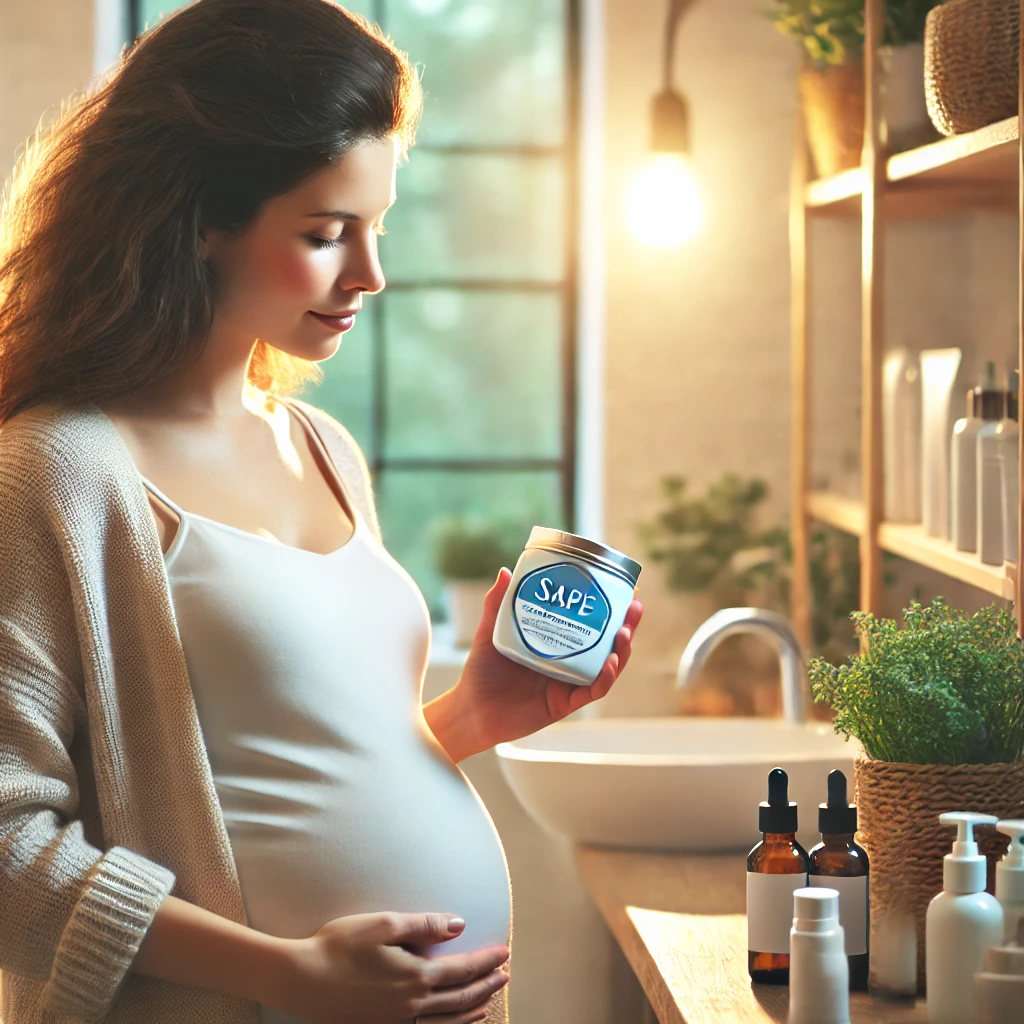Table of Contents
Introduction to Skincare Safety During Pregnancy
The significance of skincare safety during pregnancy cannot be overstated, as the physiological changes that occur in a woman’s body can affect the overall effectiveness and safety of various skincare products. During pregnancy, a woman experiences alterations in hormone levels, which may lead to increased skin sensitivity and varying skin conditions. This makes it crucial to evaluate the components of skincare formulas thoroughly, as some ingredients could potentially lead to adverse effects for both the mother and her developing fetus.
The potential implications of using certain skincare ingredients warrant careful consideration. Some substances, although effective for common skin issues, may not be suitable during pregnancy due to their ability to penetrate the skin and enter systemic circulation. For instance, certain active compounds found in commonly used products—such as retinoids, salicylic acid, and various essential oils—have been associated with risks that could endanger fetal development or cause complications during pregnancy. Therefore, pregnant individuals must be aware of which ingredients to avoid to ensure both their health and the well-being of their unborn child.
The overarching goal should be to make informed choices regarding skincare products. Consulting with a healthcare provider can provide valuable insights and guidance customized to each individual’s needs. By prioritizing safety and taking the necessary precautions, expectant mothers can create a skincare routine that caters to their unique physiological state while simultaneously minimizing potential risks. Awareness and caution are paramount in navigating the complex landscape of skincare during pregnancy, thereby fostering a safe environment for the mother and the baby.

Understanding the Risks: How Ingredients Can Affect Pregnancy
Pregnancy is a critical period that necessitates heightened awareness concerning skincare products. Certain ingredients in cosmetics and topical applications can pose risks to both the developing fetus and the mother. Understanding the mechanisms through which these ingredients operate is essential for safeguarding health during this delicate time.
One of the primary concerns regarding certain skincare ingredients involves hormonal disruptions. Some compounds can mimic hormones or interfere with the body’s endocrine system, potentially leading to imbalances that may negatively impact fetal development. For instance, ingredients like parabens and phthalates are thought to disrupt hormonal function, possibly affecting reproductive health and development during pregnancy.
Additionally, many active ingredients can lead to skin irritations, which are particularly problematic during pregnancy when the skin may be more sensitive. Retinoids, often lauded for their anti-aging benefits, can cause redness, peeling, and irritation, symptoms that are best avoided during pregnancy. It is also important to note that some chemical sunscreens may penetrate the skin and enter the bloodstream, raising concerns about their effects on a developing fetus.
There are other health risks associated with certain ingredients, such as the use of hydroquinone, a skin brightening agent, which has been linked to potential toxicity. The accumulation of harmful substances in the body can also create undue strain on the liver and other organs, which play crucial roles in supporting a healthy pregnancy.
Given these factors, it becomes essential for pregnant individuals to carefully scrutinize ingredient lists in their skincare products. Knowledge of which substances to avoid contributes to better health outcomes during this vital stage of life. Therefore, understanding the risks associated with specific skincare ingredients empowers expecting mothers to make informed choices regarding personal care products.
Common Skincare Ingredients to Avoid
During pregnancy, it is crucial for individuals to be mindful of the skincare products they use, as certain ingredients can pose risks to both the mother and the developing fetus. Here are some common skincare ingredients that expectant individuals should avoid.
Retinoids, including tretinoin and adapalene, are often found in anti-aging and acne treatment products. These compounds are derivatives of vitamin A and have been linked to congenital disabilities when used in high doses during pregnancy. While topical retinoids have a lower absorption rate, it is generally recommended to avoid their use to prevent any potential risk. Opting for vitamin C or glycolic acid instead can provide similar benefits without the dangers associated with retinoids.
Salicylic acid is another ingredient frequently encountered in acne-fighting products. It belongs to the beta-hydroxy acid (BHA) family and is effective for treating breakouts. However, when used in high concentrations, salicylic acid may penetrate the skin and increase the risk of complications. Most experts suggest using products with this ingredient in lower concentrations or switching to alternative blemish treatments that are deemed safer for pregnant individuals.
Certain essential oils are commonly used in skincare for their aromatic and therapeutic properties. However, some essential oils, such as rosemary, basil, and sage, can stimulate uterine contractions, which may pose risks during pregnancy. It is advisable to consult a healthcare provider regarding which essential oils are safe to use and how they should be applied.
By paying attention to these common skincare ingredients, pregnant individuals can take proactive steps to ensure their safety and that of their unborn child. Awareness and education regarding product formulations will further facilitate informed decision-making when selecting suitable skincare options during this important period.
Identifying Unsafe Products: Tips and Tricks
Choosing safe skincare products during pregnancy is paramount for the health of both the expectant mother and the developing fetus. With numerous products available on the market, it can often be challenging to determine which ones are safe and which should be avoided. Here are some practical tips for identifying potentially unsafe skincare products.
Firstly, reading ingredient labels is crucial. When examining a product, the list of ingredients is typically found on the packaging. It is essential to familiarize oneself with common unsafe ingredients, such as retinoids, salicylic acid, and certain essential oils, which can pose risks during pregnancy. By learning to recognize these components, you can more easily identify products that may not be safe.
Understanding chemical names is another vital aspect. Many skincare ingredients may have complex or scientific names that do not immediately indicate their nature or safety. A good reference guide can help decode these names and provide insight into which chemicals are considered safe for use during pregnancy. Utilizing reputable online databases or mobile applications dedicated to cosmetics safety can assist in conducting this research efficiently.
Additionally, pregnant individuals should consider seeking recommendations from healthcare professionals, such as dermatologists or obstetricians, who can offer expert advice on skincare products suitable for pregnancy. Other resources, such as pregnancy-focused forums and social media groups, can also provide valuable tips and personal experiences regarding product safety.
In instances where a product may contain potentially harmful ingredients, there are often safer alternatives available. Many brands now offer specially formulated skincare lines designed for pregnancy, focusing on gentle and soothing ingredients. Transitioning to these safer options can help in maintaining skin health without compromising safety.
Consulting with Healthcare Professionals: When to Seek Help
During pregnancy, the body undergoes significant hormonal and physical changes, which can affect the skin in various ways. As a result, it is crucial for expectant mothers to be proactive in consulting with healthcare professionals to ensure their skincare routines are safe for both the mother and the developing fetus. Dermatologists and obstetricians are invaluable resources in providing tailored skincare advice that takes into account individual health circumstances and conditions.
When visiting a healthcare professional, it is essential to come prepared with questions. Mothers-to-be should inquire about specific skincare ingredients that may pose risks during pregnancy. This includes common substances found in beauty products that could potentially affect fetal development or lead to complications. For instance, ingredients such as retinoids, salicylic acid, and certain essential oils can be controversial during pregnancy, warranting a detailed discussion about their safety and suitable alternatives.
Moreover, expressing any existing skin concerns is vital. Conditions such as acne, eczema, or melasma often require tailored approaches during pregnancy, and healthcare providers can recommend appropriate treatments that align with safety guidelines. When discussing potential skincare products, mothers should voice concerns about anything they feel uncertain about, fostering an open dialogue that promotes informed decision-making.
In addition, keep in mind the importance of ongoing communication. As pregnancy progresses and bodily changes continue to evolve, what may have been suitable advice early on may need reevaluation. Regular consultations can help adjust skincare routines as necessary, ensuring the health and well-being of both mother and child. With the right guidance, expectant mothers can navigate the complexities of skincare with confidence and care.
Safe Skincare Ingredients for Expecting Mothers
During pregnancy, the body goes through various changes that may affect the skin. As a result, many expecting mothers are understandably cautious about the skincare products they choose. Fortunately, there are several skincare ingredients that are deemed safe and beneficial for use during this period, offering reassurance to pregnant individuals while nurturing their skin.
One of the standout ingredients for skincare during pregnancy is hyaluronic acid. This powerful humectant helps in retaining moisture and keeping the skin hydrated, which is crucial as hormonal changes can often lead to dryness. Hyaluronic acid works by attracting water to the skin, making it appear plump and radiant. Its lightweight texture is suitable for all skin types and is known to minimize the appearance of fine lines, providing a youthful glow that many expectant mothers desire.
Vitamin C is another excellent ingredient that can safely be incorporated into a pregnancy skincare routine. Renowned for its antioxidant properties, vitamin C plays a pivotal role in brightening the skin tone and reducing dark spots, which can sometimes occur during pregnancy due to hormonal fluctuations. It also aids in collagen synthesis, helping maintain the skin’s elasticity and firmness throughout the pregnancy journey. When used in serums or creams, vitamin C can enhance the overall appearance of the skin, promoting a healthy, vibrant look.
In addition to these, natural oils, such as grapeseed oil, almond oil, and jojoba oil, are highly beneficial. These oils provide essential fatty acids that nourish and moisturize the skin. They can help alleviate skin conditions like stretch marks by maintaining skin elasticity. The gentle nature of these oils makes them suitable for sensitive skin, ensuring that pregnant individuals can enjoy their skincare routines without worry.
Incorporating these safe skincare ingredients can significantly enhance the skincare experience during pregnancy, enabling mothers-to-be to maintain their skincare routines while prioritizing their health and well-being.
The Role of Hormones in Skin Changes During Pregnancy
Pregnancy is marked by significant hormonal fluctuations that play a crucial role in the physical and emotional changes experienced by a woman. During this period, hormones such as estrogen and progesterone reach elevated levels, fundamentally altering skin conditions. These hormonal surges can lead to various skin issues, necessitating adjustments in skincare routines to address the evolving needs of the skin.
One common skin concern during pregnancy is acne, often exacerbated by increased oil production triggered by hormonal changes. While many expectant mothers may have maintained clear skin prior to pregnancy, the new influx of hormones can result in breakouts, requiring a shift in the choice of skincare ingredients. It is essential to avoid certain acne treatments and other products deemed unsafe for both the mother and the developing fetus.
Hyperpigmentation, characterized by dark patches on the skin, is another prevalent issue stemming from hormonal changes. This condition, known as melasma or the “mask of pregnancy,” can affect the face and other sun-exposed areas of the body due to an increase in melanin production. Pregnant women are encouraged to embrace sun protection and adjust their skincare regimen accordingly, steering clear of specific harsh ingredients that could pose risks during this sensitive period.
Additionally, many women experience dryness and sensitivity, which can result from hormonal shifts as well as physiological changes such as increased blood volume. To alleviate these skin concerns, it is advisable to select gentle, hydrating products that are free from irritating additives. Balancing hydration while avoiding unnecessary chemicals may significantly improve the overall skin condition throughout pregnancy.
Ultimately, understanding the connection between hormones and skin changes allows expecting mothers to make informed choices about their skincare routines, ensuring the health and safety of both themselves and their babies.
Natural and Organic Skincare: A Closer Look
The appeal of natural and organic skincare products has grown significantly, especially among pregnant women who are seeking safer alternatives for their skin. Often perceived as inherently safe, these products are marketed as gentle and free from harmful chemicals, which can be particularly attractive during a time when expectant mothers are more cautious about what they apply to their skin. Nevertheless, it is essential to recognize that the term “natural” is not synonymous with safety. Thus, it is crucial for consumers to educate themselves about the ingredients in their skincare routines.
Despite the organic label, some products may still include harmful additives or synthetic components that can pose risks during pregnancy. Many brands highlight ingredients derived from natural sources; however, without stringent regulations, these claims may not always be reliable. Therefore, it is vital to scrutinize ingredient lists meticulously to ensure the products do not contain potentially harmful substances such as phthalates, parabens, or essential oils known for their potential adverse effects.
When choosing genuinely safe organic skincare products, look for certifications from reputable organizations, which can provide an added layer of security. Additionally, focus on those formulations that emphasize transparency, listing all components clearly on their packaging. A thorough understanding of common hazardous ingredients is also beneficial—by reaching out to healthcare professionals or utilizing online resources, consumers can gain further insight into what to avoid. Ultimately, the responsibility falls on individuals to investigate product formulations and prioritize their health and well-being during pregnancy, while also embracing the benefits of natural skincare options.
Conclusion: Prioritizing Skin Health in Pregnancy
In conclusion, it is essential to acknowledge the significant changes that occur in a woman’s body during pregnancy, which can impact both skin health and overall wellbeing. As highlighted throughout this guide, certain skincare ingredients can pose risks to both the expectant mother and the developing fetus. Therefore, being informed about which ingredients to avoid is crucial for maintaining safe skincare practices.
Key ingredients such as retinoids, salicylic acid, and hydroquinone are commonly found in various skincare products and can potentially lead to adverse effects. Expectant mothers should be particularly cautious and consider alternatives that are safer during this critical period. Natural ingredients, which provide nourishment without the associated risks of synthetic compounds, are often recommended for maintaining skin health throughout pregnancy.
Moreover, it is vital for pregnant women to stay abreast of the evolving skincare guidelines and to prioritize products that are formulated specifically for their unique needs. Consulting healthcare professionals, including dermatologists and obstetricians, can provide personalized advice and ensure that skincare choices align with maternal health objectives. This collaborative approach not only enhances skin health but also supports the overall health of both mother and child.

To conclude, being proactive in avoiding harmful skincare ingredients is an essential step for any pregnant woman. By prioritizing informed decisions and safe practices, expectant mothers can protect their skin while also fostering a healthy environment for their baby’s development. Staying vigilant and seeking professional guidance can significantly contribute to a positive pregnancy experience.






Hello very nice web site!! Guy .. Excellent .. Wonderful .. I’ll bookmark your site and take the feeds also…I am glad to seek out numerous helpful information here in the post, we want work out extra strategies on this regard, thanks for sharing. . . . . .